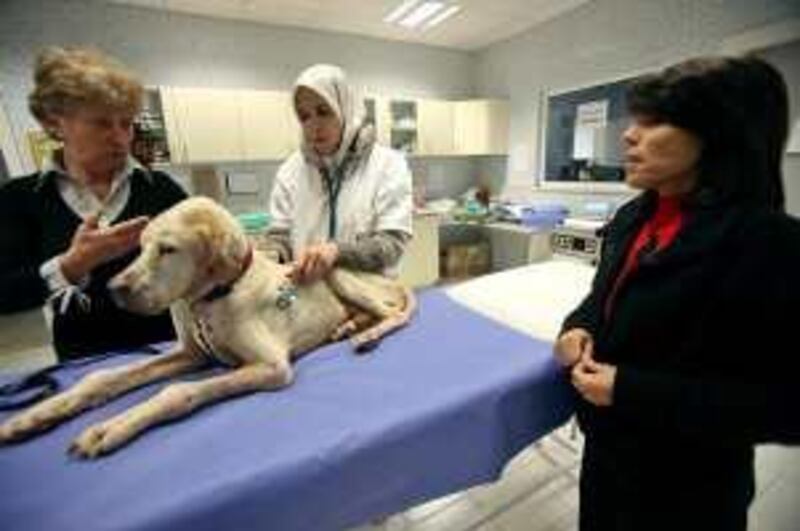AMMAN // The smell of disinfectant fills the air. With good reason. This is a centre for animal welfare, located on the outskirts of Amman, where injured, stray and abandoned animals receive veterinary care and a home. On a recent visit, dozens of cats were in incubators in the intensive care unit, while others in a hall awaiting adoption nibbled food. Twenty horses were there to receive treatment, some for wounds sustained during farm work.
In Jordan, where street cats are shooed away and stones thrown at stray dogs, it is uncommon to see animals receive critical care. But the Humane Centre for Animal Welfare, a non-governmental organisation created in 2000, is trying to instil new feelings towards animals among Jordanians by promoting kindness and humane behaviour. "It just changes all the attitudes and puts our manners in place," said Margaret Ledger, director general and founder of the centre. "Animals have the right to live on Earth just like us. You can feel their pain. You can also see how a mare is happy when its offspring starts running around."
The centre has two veterinary clinics, one of which provides free services to impoverished owners whose livelihoods depend on their animals. "Animals are an economic benefit for the poor. We have to protect them. We need to improve the behavioural patterns of people who mistreat them out of negligence and ignorance. Animals plough, work and are used to transport tourists in places like Petra," Mrs Ledger, a Jordanian of British origin, said.
To ensure the centre's sustainability, the centre profits by providing community services, including boarding. What matters most to Mrs Ledger, who has worked with animals for two decades, is to spread a culture of awareness on how to treat animals. The centre has run a programme in cooperation with the ministry of education since 2001, in which animal clubs have been set up in 130 public schools.
"Students are taught in a 300-page manual about animal welfare, from diseases and human behaviour, to how animals are treated in circuses and pet shops," Mrs Ledger said. Other activities include field trips, where students between the ages of nine and 17 get the chance to pet animals, interact with them and learn about their environments and behaviour. "We teach children that they need to be calm when they deal with animals," said Nadia Hammam, head of the centre's educational section. "We also tell them how important it is for animals to live in their own habitat and within families instead of being sold in pet shops or displayed in zoos."
She pointed to a monkey that was playing in its cage. It was confiscated two years ago from a pet shop. To sell such animals on the open market is illegal; the centre hopes to resettle it in its proper habitat. The attitude towards animals is gradually changing, particularly among the young generation. Mrs Ledger said children, becoming increasingly aware of animals' needs to have a better life and place to live, are treating animals better.
On Saturday, 30 teenagers participated in a dog walk around the centre in their quest to raise awareness about the welfare of animals. For Laith Attiyeh, the teenager behind the idea, it is the mistreatment of animals that motivated him to come up with the event. "People leave their dogs tied up, and they do not give them enough food or walk them. Some also use them in dog fights," Laith, 15, said.
But many Jordanians find it unbelievable that animals are being lavished with such care in a developing country. "That's because in our culture we tend to make fun of people who care about animals, even though Islam stresses it. People think that it is more important to provide care for human beings who are hardly making ends meet," said Mustafa Muhsen, a member of the committee supervising school curricula at the education ministry.
Mrs Ledger said she believes existing regulations to protect animals are not enforced, particularly those in pet shops and zoos. "Just [recently] a woman nearly collapsed at the centre as she was describing to me how a man was cutting a monkey's nails with a plier at one of the zoos," Mrs Ledger said. "She said the monkey was in pain, and there was blood. The worst part is that there were people laughing."
The centre is trying to expand. "We have now another plot of land, 18,000 square metres. This project is going to be like an educational park, with learning through fun. There will be [artificial] animals and children will learn about life in the North Pole, the Arctic and the savannah. It needs a lot of money. Once set up, the educational park will take care of the two hospitals [financially]."
smaayeh@thenational.ae





